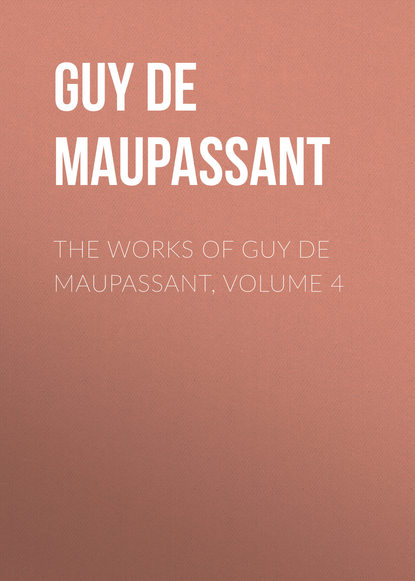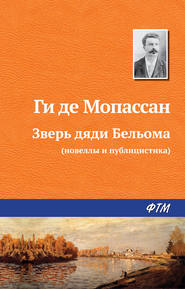По всем вопросам обращайтесь на: info@litportal.ru
(©) 2003-2024.
✖
The Works of Guy de Maupassant, Volume 4
Настройки чтения
Размер шрифта
Высота строк
Поля
For the last eight days, it had been snowing, and the brown earth, the earth already fertilized by the autumn savings had become livid, sleeping under a great sheet of ice.
It was cold in the thatched houses adorned with white caps; and the round apples in the trees of the enclosures seemed to be flowering, powdered as they had been in the pleasant month of their blossoming.
This day, the big northern clouds, the gray clouds laden with glittering rain had disappeared, and the blue sky showed itself above the white earth on which the rising sun cast silvery reflections.
Césaire looked straight before him through the window, thinking of nothing happy.
The door opened, two women entered, peasant women in their Sunday clothes, the aunt and the cousin of the bridegroom, then three men, his cousins, then a woman who was a neighbor. They sat down on chairs, and they remained motionless and silent, the women on one side of the kitchen, the men on the other suddenly seized with timidity, with that embarrassed sadness which takes possession of people assembled for a ceremony. One of the cousins soon asked:
"It is not the hour – is it?"
Césaire replied:
"I am much afraid it is."
"Come on! Let us start," said another.
Those rose up. Then Césaire, whom a feeling of uneasiness had taken possession of, climbed up the ladder of the loft to see whether his father was ready. The old man, always as a rule an early riser, had not yet made his appearance. His son found him on his bed of straw, wrapped up in his blanket, with his eyes open, and a malicious look in them.
He bawled out into his ear: "Come, daddy, get up. 'Tis the time for the wedding."
The deaf man murmured in a doleful tone:
"I can't, I have a sort of cold over me that freezes my back. I can't stir."
The young man, dumbfounded, stared at him, guessing that this was a dodge.
"Come, daddy, we must force you to go."
"Look here! I'll help you."
And he stooped towards the old man, pulled off his blanket, caught him by the arm and lifted him up. But the old Amable began to whine:
"Ooh! Ooh! Ooh! What suffering! Ooh! I can't. My back is stiffened up. 'Tis the wind that must have rushed in through this cursed roof."
"Well, you'll have no dinner, as I'm having a spread at Polyte's inn. This will teach you what comes of acting mulishly."
And he hurried down the ladder, then set out for his destination, accompanied by his relatives and guests.
The men had turned up their trousers so as not to soil the ends of them in the snow. The women held up their petticoats and showed their lean ankles, their gray woolen stockings, and their bony shanks resembling broomsticks. And they all moved forward balancing themselves on their legs, one behind the other without uttering a word in a very gingerly fashion through caution lest they might miss their way owing to flat, uniform uninterrupted sweep of snow that obliterated the track.
As they approached some of the farm houses, they saw one or two persons waiting to join them, and the procession went on without stopping, and wound its way forward, following the invisible outlines of the road, so that it resembled a living chaplet with black beads undulating through the white country side.
In front of the bride's door, a large group was stamping up and down the open space awaiting the bridegroom. When he appeared they gave him a loud greeting; and presently, Céleste came forth from her room, clad in a blue dress, her shoulders covered with a small red shawl, and her head adorned with orange-flowers.
But everyone asked Césaire:
"Where's your father?" he replied with embarrassment.
"He couldn't move on account of the pains."
And the farmers tossed their heads with an incredulous and waggish air.
They directed their steps towards the Mayor's office. Behind the pair about to be wedded, a peasant woman carried Victor's child, as if it were going to be baptized; and the male peasants, in pairs, now went on, with arms linked, through the snow with the movements of a sloop at sea.
After having been united by the Mayor in the little municipal house, the pair were made one by the curé, in his turn, in the modest house of the good God. He blessed their couplement by promising them fruitfulness, then he preached to them on the matrimonial virtues, the simple and healthful virtues of the country, work, concord, and fidelity, while the child, seized with cold, began bawling behind the backs of the newly-married pair.
As soon as the couple reappeared on the threshold of the church, shots were discharged in the moat of the cemetery. Only the barrels of the guns could be seen whence came forth rapid jets of smoke; then a head could be seen gazing at the procession. It was Victor Lecoq celebrating the marriage of his old sweetheart, wishing her happiness and sending her his good wishes with explosions of powder. He had employed some friends of his, five or six laboring men, for these salvoes of musketry. It could be seen that he carried the thing off well.
The repast was given in Polyte Cacheprune's inn. Twenty covers were laid in the great hall where people dined on market-days, and the big leg of mutton turning before the spit, the fowl browned under their own gravy, the chitterling roasting over the warm bright fire, filled the house with a thick odor of coal sprinkled with fat – the powerful and heavy odor of rustic fare.
They sat down to table at midday, and speedily the soup flowed into the plates. The faces already had brightened up; mouths opened to utter loud jokes, and eyes were laughing with knowing winks. They were going to amuse themselves and no mistake.
The door opened, and old Amable presented himself. He seemed in bad humor and his face wore a scowl, and he dragged himself forward on his sticks, whining at every step to indicate his suffering. The sight of him caused great annoyance; but suddenly, his neighbor, Daddy Malivoire, a big joker, who knew all the little tricks and ways of people, began to yell, just as Césaire used to do, by making a speaking-trumpet of his hands.
"Hallo, my cute old boy, you have a good nose on you to be able to smell Polyte's cookery from your own house!"
An immense laugh burst forth from the throats of those present. Malivoire, excited by his success, went on:
"There is nothing for the rheumatics like a chitterling poultice! It keeps your belly warm, along with a glass of three-six!"
The men uttered shouts, banged the table with their fists, laughed, bending on one side and raising up their bodies again as if they were each working a pump. The women clucked like hens, while the servants wriggled, standing against the walls. Old Amable was the only one that did not laugh, and, without making any reply, waited till they made room for him.
They found a place for him in the middle of the table facing his daughter-in-law, and, as soon as he was seated, he began to eat. It was his son who was paying, after all it was right he should take his share. With each ladlefull of soup that fell into his stomach, with each mouthful of bread or meat crushed under his gums, with each glass of cider or wine that flowed through his gullet, he thought he was regaining something of his own property, getting back a little of his money which all those gluttons were devouring, saving in fact, a portion of his own means. And he ate in silence with the obstinacy of a miser who hides his coppers, with the gloomy tenacity which he exhibited in former days in his persistent toils.
But all of a sudden he noticed at the end of the table Céleste's child on a woman's lap, and his eye remained fixed on the little boy. He went on eating, with his glance riveted on the youngster, into whose mouth the woman who minded him every now and then put a little stuffing which he nibbled at. And the old man suffered more from every mouthful taken in by this little grub than by all that the others swallowed.
The meal lasted till evening. Then everyone went back home.
Césaire raised up old Amable.
"Come, daddy, we must go home," said he.
And put the old man's two sticks in his hands
Césaire took her child in her arms, and they went on slowly through the pale night whitened by the snow. The deaf old man, three-fourths tipsy, and even more malicious under the influence of drink, persisted in not going on. Several times he even sat down with the object of making his daughter-in-law catch cold, and he kept whining, without uttering a word, giving vent to a sort of continuous groaning as if he were in pain.
When they reached home, he at once climbed up to his loft, while Césaire made a bed for the child near the deep niche where he was going to lie down with his wife. But as the newly wedded pair could not sleep immediately, they heard the old man for a long time moving about on his bed of straw, and he even talked loudly several times, whether it was that he was dreaming or that he let his thoughts escape through his mouth, in spite of himself, without being able to keep them back, under the obsession of a fixed idea.
When he came down his ladder, next morning, he saw his daughter-in-law looking after the house-keeping.
She cried out to him:
"Come, daddy, hurry on! Here's some good soup."
And she placed at the end of the table the round black gray pot filled with smoking liquid. He sat down without giving any answer, seized the hot jar, warmed his hands with it in his customary fashion; and, as it was very cold, even pressed it against his breast, to try to make a little of the living heat of the boiling water enter into him, into his old body stiffened by so many winters.
Then he took his sticks and went out into the fields, covered with ice, till it was time for dinner, for he had seen Céleste's youngster still asleep in a big soap-box.

















